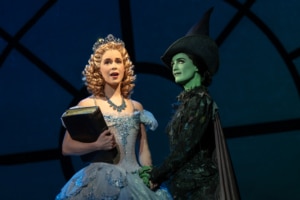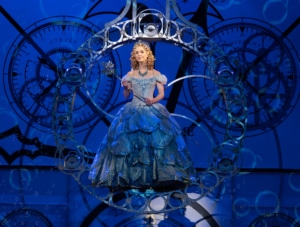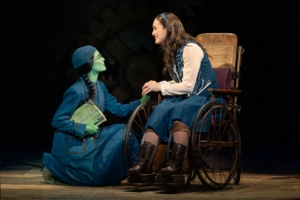DCPA NEWS CENTER
Enjoy the best stories and perspectives from the theatre world today.
Enjoy the best stories and perspectives from the theatre world today.
In 1900, author L. Frank Baum, wrote a charming book called The Wonderful Wizard of Oz that became a children’s classic. The book was turned into a stage musical a year later and begat another great classic: the 1939 film The Wizard of Oz. Judy Garland played a girl who, after a close encounter of the tornado kind, found herself in a strange and mysterious land. Dorothy was her name and all she really wanted was to get back home to Kansas. The film’s iconic characters and images have become so deeply ingrained in our collective consciousness that psychologists use the movie as an archetype of the hero’s journey. Like Dorothy, all we want, it would seem, is to find our way back home.

Austen Danielle Bohmer as Glinda and Lauren Samuels as Elphaba in the National Tour of WICKED. Photo by Joan Marcus 2024
The next Oz-ian incarnation came along in 1975 when a sleek version of the story called The Wiz, featuring an all-black cast, opened on Broadway. It ran for 1,672 performances and was later made into a movie with a remount touring the Buell Theatre next April.
Then, in 1995, strident political satirist and author Gregory Maguire wrote a gargantuan and immensely popular fantasy novel, Wicked: The Life and Times of the Wicked Witch of the West. In an ironic twist — everything in Oz seems to have an ironic twist — the book examines, among other things, the nature of good and the nature of evil. Maguire found them alarmingly and inextricably entwined.
Then the adventures in Oz morphed once again, this time into a stage production adapted from Maguire’s book. Its latest life form is that of the Tony Award-winning musical by composer-lyricist Stephen Schwartz (Godspell, Pippin) and librettist Winnie Holzman (“My So Called Life,” “thirtysomething”).
Wicked tells a tale that is about as far removed from Baum’s Wonderful Wizard of Oz as the Emerald City is from Wichita. The show’s dark, witty, sophisticated charm made it the hottest ticket on Broadway when it debuted, and it remains “popular” more than 20 years later.

Austen Danielle Bohmer as Glinda in the National Tour of WICKED. Photo by Joan Marcus 2024
Glinda the good witch is still there, but what, the musical inquires, is goodness after all? The main action revolves around Elphaba, the so-called Wicked Witch (named by Maguire as a derivation of L. Frank Baum’s initials). Elphaba proves the popular adage that, indeed, it’s not easy being green. Born a lovely shade of jade, she is misunderstood, shunned and persecuted. While this naturally takes its toll, the question remains: is she evil? The answer is as ambiguous as her name. Elphaba and Glinda’s unlikely friendship illustrates the fact that it’s not simple trying to figure out which witch is which.
“The idea behind Wicked is that things are not as they seem,” notes Holzman. “What you think you know, you don’t really know. It is the premise of the novel that you know certain things, but you don’t know the deeper story.”
The same notion drew composer Stephen Schwartz to the project: “I’m often attracted to an idea that takes a familiar story and spins it, looking at it from another direction, like Stoppard’s Rosencrantz and Guildenstern Are Dead. I like it when I see things like that, and I like to write them. For me, if you take a familiar story — whether it be the Book of Genesis or The Wizard of Oz — and you come at it from another point of view, the tension between the audience’s preconception and the approach you’re taking to the story adds an extra level of response, plus it helps to clarify the points you’re trying to make.

Lauren Samuels as Elphaba and Erica Ito as Nessarose in the National Tour of WICKED. Photo by Joan Marcus 2024
“The idea of taking what is one of the iconic villains of American culture, the Wicked Witch of the West — so much ‘the villain’ that we don’t even know her name — and looking at it from her point of view, that seemed to me a brilliant concept. It was clear that a show about her could explore some of my favorite themes: the difference between surface appearances and what’s really going on underneath, how life is more complex and has more ambiguity than we tend to be comfortable with and, certainly, than our public discourse admits to.”
Schwartz also found the whole idea inherently musical.
“Oz is a fantastical, larger-than-life setting full of characters who almost demand to sing,” he said, “and the witch herself is so full of big emotions — rage, ambition and longing — the idea was screaming to be a musical.”
In addition, tucked into this timeless tale is enough eye-popping technical wizardry in Eugene Lee’s award-winning sets to keep everyone this side of Oz happy. Yet beyond the show’s infectious score and mind-boggling sets is a thoughtful universal theme. Actor David Garrison, who played The Wizard in Denver’s first touring engagement, wisely suggested: “There’s a Green Girl in all of us…. Everyone has felt like the outcast at one time or another. It’s part of the show’s broad appeal. It’s not a children’s show, but kids enjoy the fantasy of it, adolescents get the love story and adults see the political allegory.
“This show is like a rock concert every night. It’s very heartening to see that. It’s what theatre does best.”
